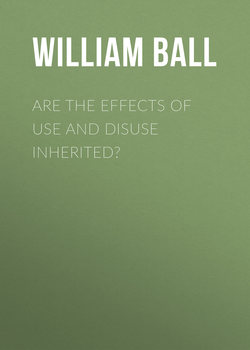Читать книгу Are the Effects of Use and Disuse Inherited? - Ball William Platt - Страница 14
SPENCER'S EXAMPLES AND ARGUMENTS
INHERITED INSANITY AND NERVOUS DISORDERS
ОглавлениеMr. Spencer infers that, because insanity is usually hereditary, and insanity can be artificially produced by various excesses, therefore this artificially-produced insanity must also be hereditary (p. 28). Direct evidence of this conclusion would be better than a mere inference which may beg the very question at issue. That the liability to insanity commonly runs in families is no proof that strictly non-inherited insanity will subsequently become hereditary. I think that theories should be based on facts rather than facts on theories, especially when those facts are to be the basis or proof of a further theory.
Mr. Spencer also points out that he finds among physicians "the belief that nervous disorders of a less severe kind are inheritable" – a general belief which does not necessarily include the transmission of purely artificially-produced disorders, and so misses the point which is really at issue. He proceeds, however, to state more definitely that "men who have prostrated their nervous systems by prolonged overwork or in some other way, have children more or less prone to nervousness." The following observations will, I think, warrant at least a suspension of judgment concerning this particular form of use-inheritance.
(1) The nervousness is seen in the children at an early age, although the nervous prostration from which it is supposed to be derived obviously occurs in the parent at a much later period of life. This change in time is contrary to the rule of inheritance at corresponding periods; and, together with the unusual promptness and comparative completeness of the inheritance, it may indicate a special injury or deterioration of the reproductive elements rather than true inheritance. The healthy brain of early life has failed to transmit its robust condition. Is use-inheritance, then, only effective for evil? Does it only transfer the newly-acquired weakness, and not the previous long-continued vigour?
(2) Members of nervous families would be liable to suffer from nervous prostration, and by the ordinary law of heredity alone would transmit nervousness to their children.
(3) The shattered nerves or insanity resulting from alcoholic and other excesses, or from overwork or trouble, are evidently signs of a grave constitutional injury which may react upon the reproductive elements nourished and developed in that ruined constitution. The deterioration in parent and child may often display itself in the same organs – those probably which are hereditarily weakest. Acquired diseases or disorders thus appear to be transmitted, when all that was conveyed to the offspring was the exciting cause of a lowered vitality or disordered action, together with the ancestral liability to such diseases under such conditions.
(4) Francis Galton says that "it is hard to find evidence of the power of the personal structure to react upon the sexual elements, that is not open to serious objection." Some of the cases of apparent inheritance he regards as coincidence of effect. Thus "the fact that a drunkard will often have imbecile children, although his offspring previous to his taking to drink were healthy," is an "instance of simultaneous action," and not of true inheritance. "The alcohol pervades his tissues, and, of course, affects the germinal matter in the sexual elements as much as it does that in his own structural cells, which have led to an alteration in the quality of his own nerves. Exactly the same must occur in the case of many constitutional diseases that have been acquired by long-continued irregular habits."13
13
Contemporary Review, December, 1875, p. 92.
